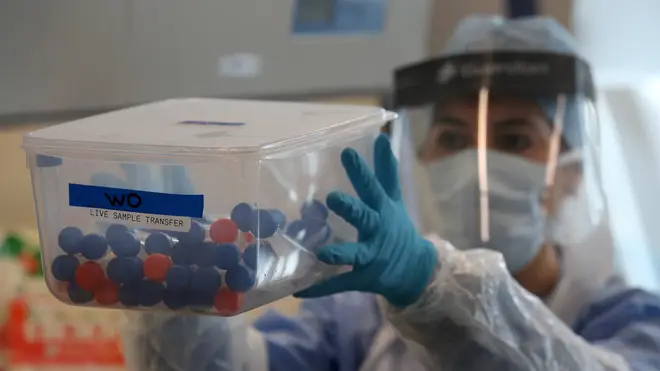
Lewis Goodall 10am - 12pm
23 April 2020, 08:17

Up to 300,000 people in Britain are planned to take part in new government research looking to understand Covid-19's rate of infection and how many people have antibodies to the virus.
In the first phase of the study, around 20,000 households are being contacted with participants providing a nose and throat swab to test whether they have coronavirus already.
Some of the adults in around 1,000 households where no one has reported symptoms will provide blood sampling for the antibody test.
Results for the first wave of research, which is a joint effort between the Department of Health and Social Care and the Office for National Statistics, are expected in early May.
It hopes to get a better representative sample of coronavirus in the UK population by age and location.
For all the latest updates on coronavirus, follow our live blog

First UK coronavirus vaccines to be trialed immediately reveals Matt Hancock
After taking the initial swabs, participants will then need to take further tests every week for the first five weeks of the study, and then every month for 12 months.
While around 25,000 people will be taking part in the initial phase, the government hopes to increase this to 300,000 people by the end of the year.
READ MORE: Sturgeon reveals she has been 'overwhelmed' at times by 'magnitude' of coronavirus crisis
For the antibody test, the research will use the Elisa test, which is currently in the process of being validated by scientists at Oxford University.
Listen & subscribe: Global Player | Apple Podcasts | Google Podcasts | Spotify
Health Secretary Matt Hancock said an understanding of the effect Covid-19 has had on the general population was a "vital part" in the ongoing response to the virus.
He said: "This survey will help to track the current extent of transmission and infection in the UK, while also answering crucial questions about immunity as we continue to build up our understanding of this new virus.
READ MORE: What are the new rules of lockdown in the UK?
"Together, these results will help us better understand the spread of the virus to date, predict the future trajectory and inform future action we take, including crucially the development of ground-breaking new tests and treatments."